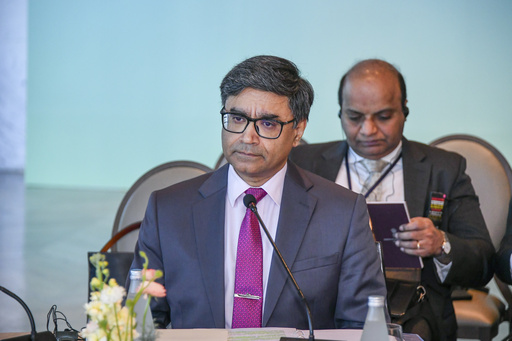
BANGKOK — In Bangkok, two days of discussions commenced Thursday, focusing on the ongoing violent political crisis in Myanmar. This event marks yet another chapter in a series of regional dialogues that have failed to yield meaningful progress toward restoring stability in the conflict-ridden Southeast Asian nation.
Since the military coup in February 2021, which removed the democratically elected government led by Aung San Suu Kyi, Myanmar has spiraled into chaos. The military regime has aggressively suppressed peaceful pro-democracy protests, leading to the formation of armed resistance groups. Efforts by the military government to silence opposition through brutal means, including air assaults, have only intensified the conflict over the last year.
Attendees at Thursday’s meeting included foreign ministers and officials from Myanmar, Laos, China, India, Bangladesh, and host country Thailand. Thai Foreign Minister Maris Sangiampongsa emphasized the significance of the discussions, marking the first time that Myanmar engaged in talks with all five neighboring nations simultaneously.
Countries bordering Myanmar are particularly concerned about the potential for regional instability, which includes substantial refugee flows resulting from the ongoing violence. Efforts to broker a peaceful resolution to the crisis have been constant, with the ten-member Association of Southeast Asian Nations (ASEAN) taking the lead in peace initiatives.
Before the talks in Bangkok on Friday, members of ASEAN—excluding Myanmar—are expected to gather. In early 2021, the group endorsed a “five-point consensus” aimed at establishing peace, yet the military leadership in Myanmar has largely disregarded this agreement, prompting ASEAN to bar officials from Myanmar’s ruling military from its meetings.
The peace framework calls for an immediate halt to violence, inclusive dialogue among all parties, mediation from an ASEAN special envoy, humanitarian aid delivery through ASEAN channels, and a visit from the special envoy to meet with all relevant stakeholders.
A limited initiative led by Thailand to provide cross-border assistance has seen some success but remains isolated. Thailand is perceived as adopting a conciliatory stance toward Myanmar’s military government, which faces widespread condemnation for its violent tactics and anti-democratic policies.
Thailand’s Maris stated that the six nations involved in Thursday’s session “agreed that direct engagement with Myanmar is critical and necessary.” Participants recognized the importance of regular meetings and shared perspectives more closely than other countries due to their direct geographic proximity to Myanmar.
According to Thai officials, the discussions were conducted in a positive and friendly manner, fostering open dialogues about border security and challenges related to transnational crime, particularly illicit drug trafficking and online scams. Myanmar’s Foreign Minister Than Swe provided an overview of the military government’s political plans, which include elections set for next year.
Opponents of the military regime, led by Senior Gen. Min Aung Hlaing, have voiced concerns over accommodating approaches to the junta. Critic Patrick Phongsathorn, a senior advocacy specialist at Fortify Rights, stated, “Rather than ‘two-track’ diplomacy, Thailand is engaging in two-faced diplomacy—publicly supporting ASEAN’s stance against the junta while quietly working to reintegrate them into the regional community.”
He added, “As the junta’s assaults increase, causing significant regional repercussions, ASEAN must firmly reject Min Aung Hlaing and his associates, as well as any attempts to legitimize their rule through the planned sham elections.”

